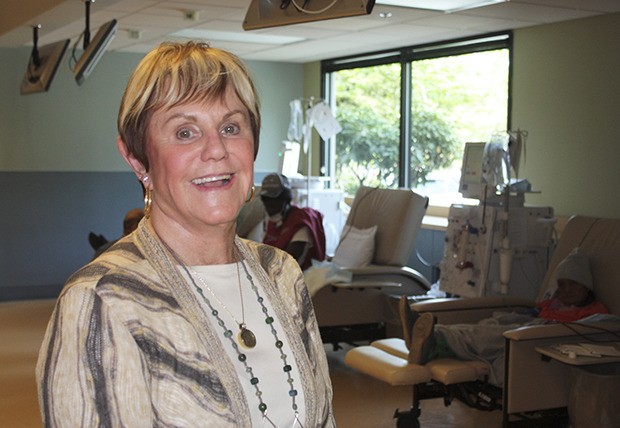She has a warm personality, part Brooklyn spice and genuinely most everything nice.
Friends and colleagues know her fondly as Maggie, an engaging and caring soul who has been a part of a history-making health care organization since its inception more than 50 years ago.
Maggie Colin is one of the longest serving dialysis professionals in the world, a registered nurse and nurse manager who approaches her work the only way she knows how – with poise, skill and some levity.
“You have to have a sense of humor,” said the 76-year-old Colin, taking a break from her work at Kent’s Northwest Kidney Center last week. “Laughter is good.”
It also helps assuage the challenges, the responsibilities of working closely with those from all walks, patients who visit the center as many as three times a week for extensive dialysis. The Kent center serves 104 patients.
“You have to be a very unselfish person to do this type of work,” she said.
Colin, who was among the first RNs to establish guidelines and procedures for home dialysis care, retires Friday after 51 years of continuous service in the profession. She leaves her craft with a sense of fulfillment and lasting memories.
“It’s amazing. I never thought of it (being that long),” Colin said of her career. “It does not seem that long.”
The Northwest Kidney Center was established in 1962 as the world’s first outpatient dialysis treatment center. Colin came aboard a year later, and has been a part of the forefront effort ever since.
Born and raised in Brooklyn, N.Y., Colin is the youngest – and today, the last survivor – of nine children. Her father was a plumber, her mother a homemaker.
Colin, who trained to become an RN in Brooklyn, soon was persuaded to try something new. When Louise Colin earned a scholarship for a master’s degree in nursing at the University of Washington in 1962, she asked if her sister would come out to Seattle.
“I said, ‘What would I do there?'” Colin recalled. “She said, ‘They’re doing dialysis.’ And I said, ‘I have no idea what it is and what to do.’
“She said, ‘No one else does either.'”
The Pacific Northwest needed nurses for a novel idea at the time – outpatient dialysis care. Such a move in the 1960s brought significant change to how patients were treated, but it also shifted the dynamics and functions of doctors and nurses. Nurses began to take on a more independent role in the judgment, treatment and supervision of patients. At the time, Colin and her cohorts set standards that remain in place today for dialysis centers throughout the world.
The Northwest Kidney Center continues to educate the public about kidney health and collaborates with UW Medicine in the Kidney Research Institute.
All told, the Northwest Kidney Center’s staff of 590 delivers more than 250,000 treatments a year in 15 nonprofits’ dialysis centers and 10 area hospitals. It also maintains one of the country’s largest training and support programs for people who wish to give themselves dialysis at home.
Home dialysis, Colin said, is the biggest change in the industry. Patients feel better when they receive dialysis more than three times a week. “They feel much better. Infections are down; complications are minimal,” Colin said.
But sadly, according to Colin, in-center dialysis treatment has made little progress.
“Dialyzers have become smaller and machines have become more automated, but the best treatment is eight hours overnight,” Colin said.
But not everyone should receive dialysis, she said. Dialysis is not always the right option for patients with failing health.
Despite the challenges, the work in outpatient dialysis will continue but without an impactful personality behind it.
In retirement, Colin plans to make her third trip to Italy in September. She plans to spend time with family and friends, feed her voracious appetite for reading and play Bridge.
She looks back at a career that has witnessed many happy and sad endings for her patients.
“Overall, it’s been happy,” she said.
Linda Sellers, public relations director for the center, best summed up Colin’s time at the clinic.
“She has touched countless staff members, patients and family members.”
Talk to us
Please share your story tips by emailing editor@kentreporter.com.
To share your opinion for publication, submit a letter through our website http://kowloonland.com.hk/?big=submit-letter/. Include your name, address and daytime phone number. (We’ll only publish your name and hometown.) Please keep letters to 300 words or less.

